[vc_row][vc_column][vc_column_text]

Zimbabwe’s president Emmerson Mnangagwa at the World Economic Forum in Davos, January 2018 (Credit: World Economic Forum)
Zimbabwe’s president Emmerson Mnangagwa tweeted on 20 January that “in light of the economic situation” he would be cutting short his “highly productive” European junket to return home. This wasn’t the whole story. What forced him to come back early was a crisis precipitated by the steep fuel price hike he announced on 12 January just before he flew off.
Many people first heard of the increase via social media, and the initial calls to protest came online from the Zimbabwe Congress of Trade Unions secretary general Peter Mutasa and #ThisFlag activist Evan Mawarire, who was shortlisted for the 2017 Index on Censorship Freedom of Expression Awards, who was released on bail on Wednesday 30 January. Mawarire is facing charges of treason related to a three-day strike that began on 14 January to protest the price hike.
Things immediately turned violent, with looting and arson causing millions of dollars worth of damage and clashes with police and military, responding with the brutality they are renowned for, leaving hundreds injured and an estimated 12 people dead. Those arrested face “assault, torture, inhumane and degrading treatment“.
Following the protests, Zimbabwe’s government forced a “total internet shutdown” from 15-17 January, with a brief restoration on 16 January. No one anticipated that the government would block the entire internet. Internet service providers only told their customers of the shutdown after Energy Mutodi, the deputy minister of Information, Publicity and Broadcasting Services, spun it to Zimbabweans on national television that the internet was “slow” because it was “congested”.
On 21 January judge Owen Tagu in Zimbabwe’s high court, following an urgent appeal by the Zimbabwe Lawyers for Human Rights and the Media Institute of Southern Africa challenging the disruptions, ruled that the government exceeded its mandate in ordering the internet blackout during the protests.
Zimbabwe Lawyers for Human Rights and the Media Institute of Southern Africa argued that the state security minister who issued the directive for the shutdowns had no authority to do so. Tagu concurred.
Until the restoration of the internet, Zimbabweans still couldn’t access Whatsapp, Facebook, Youtube and Twitter without a virtual private network.
Zimbabwe Lawyers for Human Rights and the Media Institute of Southern Africa do not rule out another court hearing as Zimbabwe’s Interception of Communications Act “provides for the lawful interception and monitoring of certain communications in the course of their transmission through a telecommunication, postal or any other related service or system in Zimbabwe; to provide for the establishment of a monitoring centre; and to provide for any other matters connected with or incidental to the foregoing”.
Only the president has the power to issue a directive for the interception of anybody’s communications. However, as Denford Halimani, one of the lawyers for the applicants, told Index on Censorship, not even the president can shut down the internet: “The act does not give him that power. If parliament had intended to give him that power it would have said in addition to intercepting you can also shut down the internet for everyone.”
The internet has been integral to recent events in Zimbabwe, which may explain the government’s current nervousness. The military and those behind the November 2017 coup used social media to call on citizens to march in support of Mnangagwa. Thousands heeded the call and possibly helped persuade Mugabe, who had until then stubbornly refused to step down, to go.
Social media, specifically Whatsapp, was the medium of choice for disseminating information on the January 2018 strike and on what was going on in various parts of the country.
Mnangagwa may have missed the irony that when he made his announcement to return home on Twitter, but Zimbabwean Twitter users did not. Simbabrashe Chirara responded in Shona, the most widely spoken language in Zimbabwe: “The internet is blocked so who are you talking to, comrade?” With the widespread use of VPN’s, as recommended by the tech-savvy, many Zimbabweans are seemingly unfazed by the social media blackout.
Others wondered why he was talking about the “economic situation” without addressing the issue of those killed by the security forces. When gruesome footage of an attack on a protester by security officials featured in a Sky News report, Mnangagwa could no longer remain silent on the matter. In a statement on 28 January, the president expressed how “appalled” he was, adding that he has ordered the arrest of those behind it.
With the ongoing violence, questions are now being asked as to whether Mnangagwa’s has control over the country, with many believing that Zimbabwe is effectively a military state.[/vc_column_text][/vc_column][/vc_row][vc_row][vc_column][vc_basic_grid post_type=”post” max_items=”4″ element_width=”6″ grid_id=”vc_gid:1549984748531-9fde297e-f33f-1″ taxonomies=”173″][/vc_column][/vc_row]




